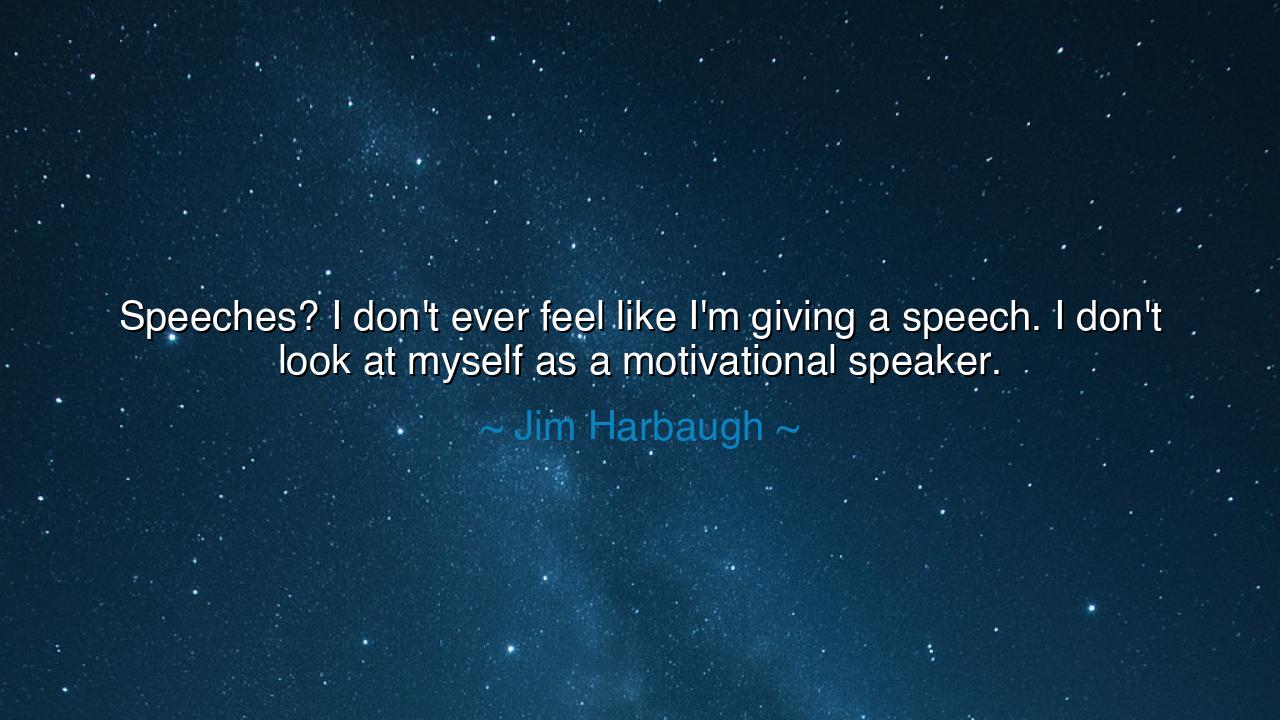
Speeches? I don't ever feel like I'm giving a speech. I don't
Speeches? I don't ever feel like I'm giving a speech. I don't look at myself as a motivational speaker.






Hear the words of Jim Harbaugh, a man of the gridiron, both player and coach, who spoke with disarming honesty: “Speeches? I don't ever feel like I'm giving a speech. I don't look at myself as a motivational speaker.” In this saying, there is a quiet but profound truth: leadership is not about performance, nor about crafting polished orations for applause. It is about living in such a way that your example itself becomes the message, your conviction the flame that lights the hearts of others. Harbaugh reveals that true influence does not come from a stage, but from authenticity.
At the heart of his words is the rejection of the idea of performance. Many believe that to inspire others one must don a role, prepare an elaborate script, or assume the mantle of a “speaker.” But Harbaugh insists that his words are not speeches at all—they are natural extensions of who he is. He does not see himself as a motivational speaker because his goal is not to impress but to lead, not to entertain but to embody. This is a lesson for all: that the deepest form of motivation is not manufactured but lived.
History confirms this truth. Consider the example of General Dwight D. Eisenhower on the eve of D-Day. He spoke to his men not with grand flourishes or poetic speeches, but with simplicity and conviction: reminding them of the mission, affirming his faith in their courage. His words were not theater, but the honest extension of his belief. Likewise, Jim Harbaugh teaches us that leadership rooted in sincerity stirs the soul more powerfully than the most ornate oration.
What Harbaugh embodies is the principle of authentic leadership. When a coach, a teacher, or a parent speaks with honesty from the heart, their message carries a weight that no rehearsed speech can match. Those who follow them sense it. They feel the alignment between word and action, between belief and deed. Harbaugh does not aspire to be a “speaker” because he already knows the greater truth: that to live one’s principles daily is to speak louder than any crafted words.
There is also humility in his statement. Many who are given the gift of influence are quick to seize the title of “motivator,” eager to claim authority. Harbaugh, however, refuses such a crown. He does not declare himself a prophet or a sage; he simply does his work, coaches his men, and lets the impact of his authenticity be its own testimony. In this humility lies a strength greater than self-promotion. For those who least seek to be called inspirational are often those who inspire the most.
The meaning of his words, then, is clear: inspiration flows not from performance but from presence. You do not need to be a polished orator to move hearts; you need to be genuine, consistent, and courageous in your actions. The truest leaders may never call themselves “motivational speakers,” yet their lives are speeches written in flesh and spirit, read silently by those who follow them.
What lesson, then, must we take? It is this: live your values so fully that you never need to give a speech. Let your integrity speak when your lips are silent. Let your courage inspire without needing to be named. Do not strive to be called a motivator; strive instead to be authentic, and you will motivate without effort.
Thus let Jim Harbaugh’s words endure: true leadership is not in delivering speeches, but in embodying truth. A man who walks his path with honesty and conviction does not need to stand upon a stage—his very life is the message, his very presence the inspiration. Let this be the guide to all who would lead: speak less, live more, and let your deeds be the eternal oration.






AAdministratorAdministrator
Welcome, honored guests. Please leave a comment, we will respond soon